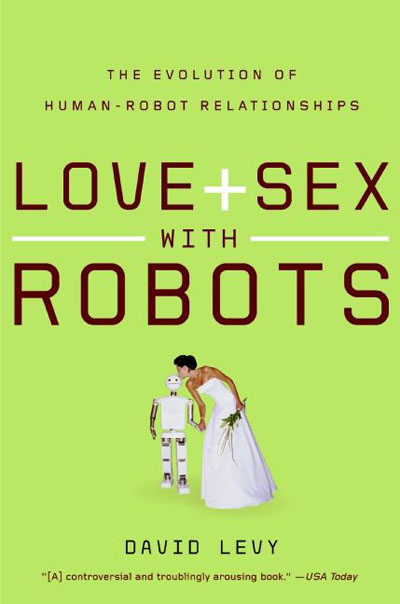By Yvonne Sam
Social and Political Commentator
 Could sex, as we know it, soon become out of place and obsolete? With the passage of time, a growing number of people will find sex and partnership entirely from either artificial agents or in virtual environments. In so doing, the emergence of a new sexual identity, termed “digisexuality”, will come into view, where through the utilization of immersive technologies, the individual, or digisexual, no longer sees the necessity to look for physical closeness with human partners.
Could sex, as we know it, soon become out of place and obsolete? With the passage of time, a growing number of people will find sex and partnership entirely from either artificial agents or in virtual environments. In so doing, the emergence of a new sexual identity, termed “digisexuality”, will come into view, where through the utilization of immersive technologies, the individual, or digisexual, no longer sees the necessity to look for physical closeness with human partners.
In 2007, David Levy prognosticated in his book, “Love + Sex with Robots: The Evolution of the Human-robot Relationships”, that by 2050, people would be doing the no-pants dance with robots.
In 2016, at an international congress on the same topic, held at Goldsmiths University in London, other academics were in agreement with Levy that not only would the trend develop, but also rapidly. www.gold.ac.uk/news/love-and-sex-with-robots-2016/
The first congress was held in November 2014 in Madeira, and Levy tried to hold the second in Malaysia in 2015, but the Muslim police banned it, only days before the event, on the grounds that it was promoting “an unnatural culture”.
Worldwide, there are around five makers of sex robots, with prices ranging from $5,400 to more than $15,700 for a “deluxe”model. Currently the market for “sexbots” is 95 percent male-dominated, but that could all be about to change.
A futurologist, named Ian Pearson (who boasts that his predictions are accurate 85 percent of the time) went even further and suggested that by 2050, humans will have more sex with robots than with other people. Based on trends in the $15 billion sex-toy industry — like VR porn and the rise of teledildonics, or remotely-controlled vibrators — Pearson believes that by 2025, women will prefer robots to men. www.thecut.com/2018/05/sex-robots-realbotix.html

In 2007, in his book, “Love + Sex with Robots: The Evolution of the Human-robot Relationships”, David Levy prognosticates that by 2050, people will be doing the no-pants dance with robots. Credit: HarperCollins Publishers.
A new survey refutes the generally-held opinion that sex robots are only for the lonesome. In a study, conducted at the University of Duisburg-Essen in Germany, that focused on what is likely to influence men as to whether or not to buy a sex robot, the co-author, Jessica Szczuka, found that of the 263 straight males surveyed, single or in a relationship, 40.3 percent said that they could imagine using a sex robot within the next five years. She also suggested that the number may be higher in the real world, as participants may have lied in the survey. imagineeringinstitute.org/50-men-purchase-sex-robots-five-years/. According to an article in the Prindle Post, although sex dolls are not exactly a popular or frequent topic of discussion, their appeal reaches more of the population than one might suspect. www.prindlepost.org/2017/08/sex-age-sex-robots/
While it is blatantly-apparent that the growing sex robot industry could soon see women becoming redundant, as regards sexual gratification, a U. S mathematician and Bloomberg opinion columnist, Dr. Cathy O’Neil, affirms that it is the human males who should be concerned, as they are at risk of being overlooked when there are dashing “menbots” available to spoil women.
Even though it may be easy to assume that sex robots are something that would be primarily favoured by men, Dr. O’Neil points out that women also have sexual desires, and are equally capable of “crude objectification”, as their male counterparts.
In a Bloomberg article, the mathematician said it is “entirely possible” that robots could be favoured over real men, by future women. www.bloomberg.com/opinion/articles/2018-01-04/maybe-sex-robots-will-make-men-not-women-obsolete.
The accompanying advances in both robotics and artificial intelligence has brought in its wake, a dystopian concern has been raised for women. What if female robots become so realistic — and so adept at sex — that they render men incapable of engaging in real human relationships? It is therefore utterly possible that robots can outperform them, being favoured by future women over real men.
Technological changes customarily brings social changes, hence it should be no surprise that improvements in birth control technologies created more sexually permissive societies. In like manner, just as these technologies served as incentives for unintended social consequences, we should expect that the propagation of robots, designed specifically for human sexual gratification, implies that sexbot-induced social change lurks on the horizon.
Some psychologists have suggested that sexual relations with robots will “desensitise humans to intimacy and empathy”. Such an admonition came from Noel Sharkey, emeritus professor of artificial intelligence and robotics at the University of Sheffield, and Dr. Aimee van Wynsberghe, assistant professor in ethics and technology at the Technical University of Delft in the Netherlands, as they launched a report on the issue in 2017. www.dailymail.co.uk/sciencetech/article-5238357/Sex-robots-make-MEN-obsolete.html
There has been circulating claims that sex robots will be unhealthy for humans, male and female, although there has been no documented research thus far. www.health24.com/Sex/News/are-sex-robots-healthy-for-humans-20180624-3
However, does thinking about the role of sex robots entail sounding the alarm on a future threat, or should we, as humans, recognize what their development reveals about the society we already have?
A present-day look at society already features robots interacting with humans in an increasing number of contexts. Feminists’ campaigns, such as the #Me Too Movement against sexual harassment, have emerged to the forefront, using technology to their advantage. At the selfsame time, under the canopy of anonymity, some males are using sex dolls as the plastic face to a backlash to #MeToo.
On the Reddit forum, the user Mgtow_man2 described his sex doll, before declaring: “Hey guess what #metoo, I have unleashed all my toxic masculinity on my supermodel feeling doll with no consequence. I “rape” her whenever I feel like it and no going to court for me. www.newstatesman.com/2018/11/no-bio-wife-will-ever-be-loyal-reddit-sex-robot-forums-radicalising-men.
Anonymous users on Reddit are emboldened to treat sex dolls as a channel for their vitriol, by the likes of alt-right mouthpiece, Milo Yiannopoulos, British-born, far-right activist and public speaker. In a 2015 article about sex dolls for Briebart, he wrote “Another reason men might be enthusiastic about female-free sex is obvious: the sociopathic, man-hating feminism we see so much of on television and in our newspapers today, is turning men off dealing with women altogether.” www.breitbart.com/politics/2015/09/16/sexbots-why-women-should-panic/
But where does this seeming outsourcing of sexual needs put us as humans?
Surely when a low-cost alternative to women that comes expense-, nagging- and insecurity-free, frankly men would plunge in headfirst.
Constant whining about “toxic masculinity,” “manspreading”, “mansplaining”, the bogus gender pay gap and the absurd campus-rape culture myth, are pushing the sexes apart, fostering mistrust and fear.
The problems begin when the men start checking out en masse. Sex with a woman will always be the prestige form of intercourse, but with the sexual marketplace changing so quickly, we may need to redefine intimacy and relationship.
Yvonne Sam, a retired Head Nurse and Secondary School Teacher, is Vice-president of the Guyana Cultural Association of Montreal. A regular columnist for over two decades with the Montreal Community Contact, her insightful and incursive articles on topics ranging from politics, human rights and immigration, to education and parenting have also appeared in the Huffington Post, Montreal Gazette, XPressbogg and Guyanese OnLine. She is also the recipient of the Governor General of Canada Caring Canadian Citizen Award.
 Pride News Canada's Leader In African Canadian & Caribbean News, Views & Lifestyle
Pride News Canada's Leader In African Canadian & Caribbean News, Views & Lifestyle





